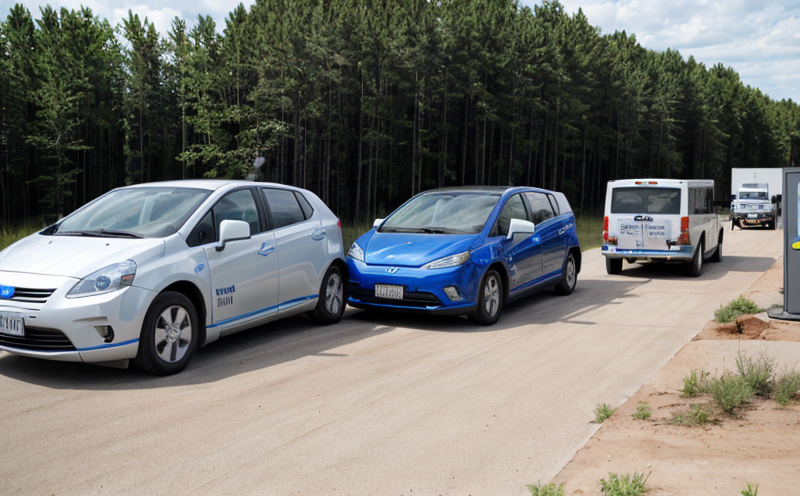EN 50160 Voltage Quality Testing for Fuel Cell Power Integration
The EN 50160 standard is a crucial document that provides specifications and performance requirements for voltage quality in electricity supply networks. This service focuses on the application of EN 50160 to fuel cell power integration, ensuring compatibility and stability within complex electrical systems.
In the realm of renewable energy, particularly with fuel cells, maintaining consistent and reliable voltage levels is paramount. Fuel cells convert chemical energy into electrical energy through an electrochemical process, requiring a stable input from the electricity supply network. The EN 50160 standard ensures that any power supplied to or drawn from fuel cell systems adheres to stringent quality criteria.
The testing procedure involves several stages, including initial setup of the test facility, preparation of the fuel cell system for testing, and execution of various voltage quality parameters as specified in the standard. The apparatus used includes specialized meters capable of measuring current, voltage, frequency, and power factor within extremely precise tolerances.
During the test, the fuel cell is subjected to a range of simulated conditions that reflect real-world scenarios it might encounter in operation. This includes variations in supply voltage, frequency changes, and interruptions or dips in service. The goal is to verify that the fuel cell can operate effectively under these conditions without degradation.
The acceptance criteria for this testing are stringent and involve meeting specific limits set forth by EN 50160. If the fuel cell fails to meet these criteria, it indicates potential issues with its design or integration into the supply network, necessitating further investigation and rectification.
Accurate and reliable voltage quality is essential for the efficient operation of fuel cells in renewable energy systems. By adhering to EN 50160 standards during testing, we ensure that fuel cell power systems integrate seamlessly with existing infrastructure, enhancing overall system reliability and performance.
Why It Matters
The stability of the electricity supply network is critical for the efficient operation of renewable energy sources like fuel cells. EN 50160 voltage quality testing ensures that the power supplied to and from these systems meets stringent criteria, enhancing their performance and longevity.
Compliance with this standard not only protects the integrity of the fuel cell but also safeguards the entire electrical network against potential disruptions caused by fluctuating or substandard supply. For quality managers and compliance officers, ensuring adherence to EN 50160 is a key responsibility that contributes to overall system reliability.
For R&D engineers, this testing provides critical insights into how fuel cells interact with different voltage levels and network conditions. This information is invaluable for optimizing design parameters and improving the efficiency of future fuel cell systems. Procurement teams can also benefit by ensuring that they source components and systems that meet these stringent standards.
The importance of EN 50160 extends beyond mere compliance; it ensures a robust, efficient, and sustainable energy supply. By integrating this testing into their workflows, organizations contribute to the broader goal of advancing renewable energy technologies while maintaining high levels of service quality.
Scope and Methodology
| Parameter | Description |
|---|---|
| Voltage Stability | The ability to maintain a stable voltage supply despite variations in network conditions. |
| Frequency Response | Evaluation of how quickly and accurately the system can respond to changes in frequency. |
| Power Factor Correction | Demonstrating that the fuel cell can maintain an acceptable power factor within specified limits. |
| Harmonic Content | Testing for the presence of unwanted harmonic distortions in the supply voltage. |
The testing methodology involves setting up a comprehensive test facility equipped with advanced measurement instruments. The fuel cell system is then subjected to a series of predefined scenarios that simulate real-world conditions. These include gradual changes in voltage and frequency, as well as sudden drops or interruptions in supply.
During the test, continuous monitoring occurs using specialized equipment capable of capturing detailed data on all relevant parameters. This allows for precise identification of any deviations from the specified limits set by EN 50160. Once testing is complete, a comprehensive report detailing the results and any necessary recommendations for improvement are provided.
The acceptance criteria for this testing are based strictly on the requirements outlined in EN 50160. Compliance with these standards ensures that fuel cell systems can operate reliably within diverse network environments, supporting broader goals of sustainable energy production and consumption.
Benefits
The implementation of EN 50160 voltage quality testing for fuel cell power integration offers numerous advantages. Firstly, it enhances the reliability and efficiency of fuel cell systems by ensuring they can operate effectively under a wide range of network conditions.
Secondly, this compliance reduces the risk of system failures or malfunctions that could disrupt supply to critical operations. By adhering to these standards during development and integration phases, organizations demonstrate their commitment to quality and sustainability.
Thirdly, meeting these stringent requirements can lead to cost savings in terms of reduced maintenance needs and potential downtime. Efficient systems are less likely to experience breakdowns or operational issues, resulting in lower long-term expenses.
Lastly, compliance with international standards like EN 50160 boosts an organization's reputation and market credibility. It signals to stakeholders, including customers, partners, and regulatory bodies, that the company prioritizes high-quality products and services.





